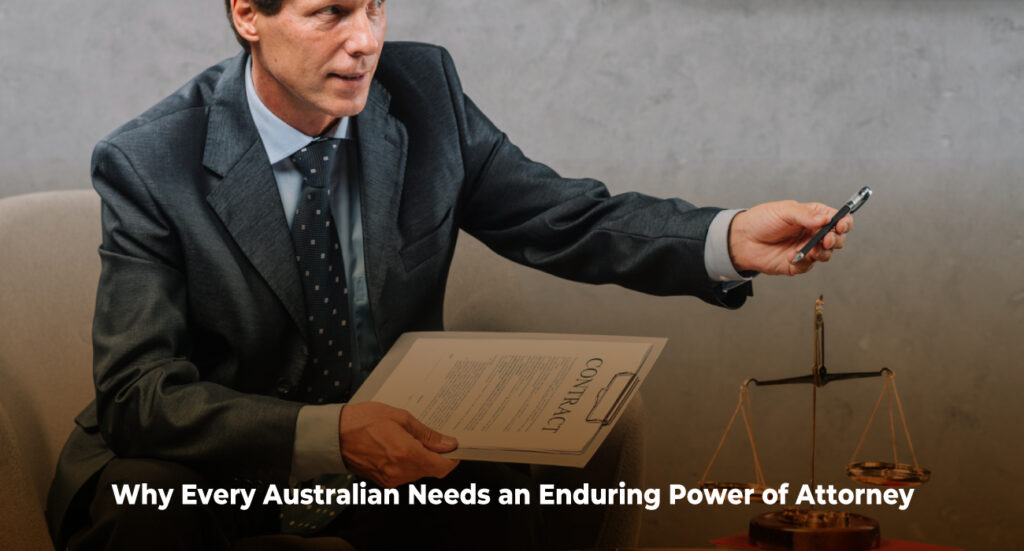Wills and Powers of Attorney in Australia – Estate Planning, Tax Benefits, and Asset Protection
Almost 90% of the time, when I sit down with a new client in one of our strategic consultations, I discover that estate planning is the very last thing on their mind. It doesn’t matter if they own multiple properties, run a thriving business, or have significant passive investments—often with children depending on them—many still don’t have a Will or a Power of Attorney in place. I’ve been meaning to write this article for a long time, but I kept asking myself: how do I make a complex and often uncomfortable topic short, clear, and easy enough for every client to grasp?
The truth is, estate planning isn’t just about signing a Will and locking it away in a drawer. It’s not just a formality your solicitor ticks off. It’s a powerful strategy that blends legal structure and tax planning—and when done well, it can protect your assets, reduce the tax burden on your loved ones, and keep your wealth safe for future generations. At Investax, we’ve seen too many families suffer unnecessary financial stress and tax bills simply because this part of their financial life was neglected.
Almost 90% of the time, when I sit down with a new client in one of our strategic consultations, I discover that estate planning is the very last thing on their mind. It doesn’t matter if they own multiple properties, run a thriving business, or have significant passive investments—often with children depending on them—many still don’t have a Will or a Power of Attorney in place. I’ve been meaning to write this article for a long time, but I kept asking myself: how do I make a complex and often uncomfortable topic short, clear, and easy enough for every client to grasp?
The truth is, estate planning isn’t just about signing a Will and locking it away in a drawer. It’s not just a formality your solicitor ticks off. It’s a powerful strategy that blends legal structure and tax planning—and when done well, it can protect your assets, reduce the tax burden on your loved ones, and keep your wealth safe for future generations. At Investax, we’ve seen too many families suffer unnecessary financial stress and tax bills simply because this part of their financial life was neglected.

What is Estate Planning in Australia?
Estate planning is the process of organising how your assets—such as property, investments, superannuation, and business interests—will be managed, protected, and ultimately passed on when you die or if you lose the capacity to make decisions. It usually involves creating a Will, setting up a Power of Attorney, and, in some cases, establishing trusts or other structures to protect assets and reduce tax. It’s not just for the wealthy—anyone with assets, dependants, or a business can benefit from having a plan in place.
A well-thought-out estate plan does more than decide who gets your assets. It influences how much of your estate actually reaches them after tax, whether those assets stay protected from outside risks, and how smoothly the transfer process happens. Without it, your family could be left navigating legal complications, facing avoidable taxes, and even losing part of their inheritance to creditors or relationship disputes.

What Happens to Your Property, Business, and Assets When You Die in Australia?
When someone passes away in Australia, their assets—including property, business interests, and other investments—initially become part of what’s known as the deceased estate. For tax purposes, the estate is treated like a trust, and the executor or legal personal representative (LPR) must apply for a Tax File Number (TFN) specifically for the estate and the executor must supply a death certificate to complete the application.
Once the estate is established, all of the deceased person’s assets—whether they are property, shares, business ownership interests, or other investments—are legally held within that estate until they are distributed to beneficiaries as per their Will. Managing the estate’s affairs includes handling post-death income, such as rent from investment properties, dividends from shares, or business earnings.
The executor is generally required to lodge deceased estate tax returns (trust tax returns) for up to the first three income years following death. During this period, the ATO allows concessional tax rates to apply to estate income, which can significantly reduce the tax burden. This requirement applies particularly if the estate earns income above the tax-free threshold, has beneficiaries entitled to income, or includes beneficiaries who are non-residents for tax purposes. From the fourth year onwards, these concessional rates no longer apply, and normal trust tax rules resume. This means that any taxable income—such as capital gains from selling assets—must be reported and taxed in line with standard rates.

Dying Without a Will in Australia: Tax and Legal Consequences
Across Australia, if someone dies without a valid Will and there is no executor or suitable administrator to manage their affairs, the Public Trustee in the relevant state or territory can step in. The Public Trustee applies for letters of administration from the Supreme Court, giving them the legal authority to act on behalf of the estate. Once appointed, they take responsibility for securing and valuing assets, paying outstanding debts and taxes, and distributing what remains according to the laws of intestacy in that jurisdiction. If there are no immediately known beneficiaries, the Public Trustee may also conduct extensive searches—including engaging genealogy specialists—to locate distant relatives or heirs living overseas. This process ensures that even in the absence of a Will or willing executor, the estate is properly managed, creditors are paid, and any remaining assets are distributed to the rightful beneficiaries.

Changing Ownership of Inherited Property in Australia: Tax and Legal Issues
One of the most common scenarios we see at Investax is when a parent passes away and leaves a property to their children. At first, it might seem straightforward—simply transfer the title into their names. But real life is rarely that simple. Sometimes one child wants to keep the property while the other wants to sell. In other cases, one sibling might want to buy out the other’s share, or they may agree to move the asset into a more secure or tax-efficient structure—such as a family trust or company—for long-term protection. Each of these decisions brings its own set of variables, negotiations, and emotional factors.
From a tax perspective, however, there’s a catch. While restructuring can provide better asset protection and greater flexibility, it often comes with a hidden sting. In most cases, transferring an inherited property into a different ownership structure after it has already been transferred to the beneficiaries will trigger both Capital Gains Tax (CGT) and stamp duty. These extra costs can significantly reduce the value of the inheritance—an outcome that could often have been avoided with careful planning written into the Will from the start.

Why Every Australian Needs an Enduring Power of Attorney
While a Will deals with what happens after death, a Power of Attorney (POA) is about what happens if you’re alive but unable to make decisions. Without a POA, no one has the legal authority to manage your finances, sell assets, or even access joint bank accounts in certain cases. This becomes especially critical for business owners—if you’re incapacitated without an Enduring Power of Attorney in place, your business could grind to a halt. Bills might go unpaid, staff wages could be delayed, and compliance deadlines missed. Your family may be forced to apply for court-appointed authority, a process that is time-consuming, stressful, and costly.
Now imagine being in a coma after a serious accident. Your mortgage repayments, utility bills, and business obligations still exist, but without a POA, no one can sign documents or access funds to keep things running—even your spouse may not have the authority to act. In these situations, your loved ones would need to go through a formal legal process to be appointed as your financial decision-maker, which can take weeks or months. During that time, your financial position can quickly unravel. A simple Enduring POA ensures someone you trust can step in immediately, keeping your affairs in order and your business and personal finances protected without unnecessary legal delays.

Testamentary Trusts in Australia: Tax Benefits and Asset Protection
A Testamentary trust is a trust created by your Will that comes into effect after your death. It’s one of the most effective yet underused estate planning tools. Assets in a testamentary trust are controlled by trustees you choose, not handed directly to beneficiaries. This can be crucial if your children are young, financially inexperienced, or going through personal challenges.
From a tax perspective, Testamentary trusts are particularly powerful. They can distribute income to minor beneficiaries, such as children or grandchildren, and those minors are taxed at adult rates. This is a major advantage compared to normal trusts, where minors are subject to penalty tax rates on unearned income. For example, if your estate earns $60,000 annually, distributing that income across three minor beneficiaries through a testamentary trust could potentially result in zero tax thanks to adult-rate tax-free thresholds.
These trusts also provide robust asset protection. If your child inherits directly and later faces bankruptcy or a divorce settlement, the inherited assets can be exposed. If the inheritance is held in a testamentary trust, it’s generally much harder for third parties to claim against it.
For a deeper understanding of how testamentary trusts can protect assets and reduce tax, explore our detailed guides: [Demystifying Testamentary Trust – Part 1] and [Managing Testamentary Trust – Part 2].
What’s Next
If you’ve been delaying your estate planning, it likely means you’ve also been neglecting broader financial planning—particularly tax and structure planning. For many people, tax minimisation is the only thing they think about, often because it feels like the most immediate problem. Some even believe an accountant can wave a magic wand to make the tax bill disappear. I wish it were that simple.
True tax minimisation needs to be part of a holistic strategy—one that combines structure planning, tax planning, asset protection, and estate planning. When these elements work together, you’re not just fixing short-term issues; you’re building a long-term plan that protects your assets, optimises your tax position, and ensures your wealth is transferred efficiently to the next generation.
If you’ve reached this point in the article and haven’t addressed these areas, now is the time to act. Book a strategic consultation with Investax—especially if your current accountant doesn’t offer this level of forward planning. Whether you’re starting from scratch or updating an existing plan, we can help you integrate smart legal structures with tax-efficient strategies. We’ll work alongside your solicitor to ensure your Will and Power of Attorney not only meet legal requirements but also safeguard your wealth for the future.
General Advice Warning
The material on this page and on this website has been prepared for general information purposes only and not as specific advice to any particular person. Any advice contained on this page and on this website is General Advice and does not take into account any person’s particular investment objectives, financial situation and particular needs.
Before making an investment decision based on this advice you should consider, with or without the assistance of a securities adviser, whether it is appropriate to your particular investment needs, objectives and financial circumstances. In addition, the examples provided on this page and on this website are for illustrative purposes only.
Although every effort has been made to verify the accuracy of the information contained on this page and on our website, Investax Group, its officers, representatives, employees and agents disclaim all liability [except for any liability which by law cannot be excluded), for any error, inaccuracy in, or omission from the information contained in this website or any loss or damage suffered by any person directly or indirectly through relying on this information.





